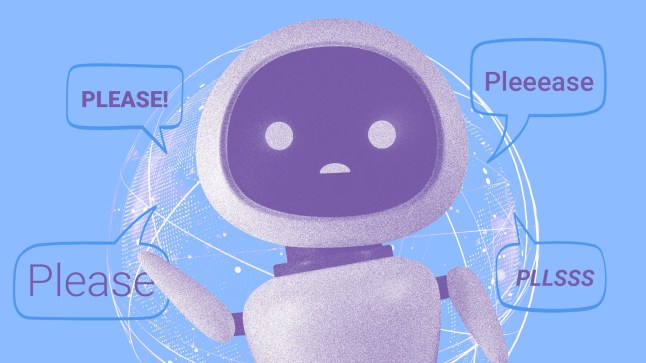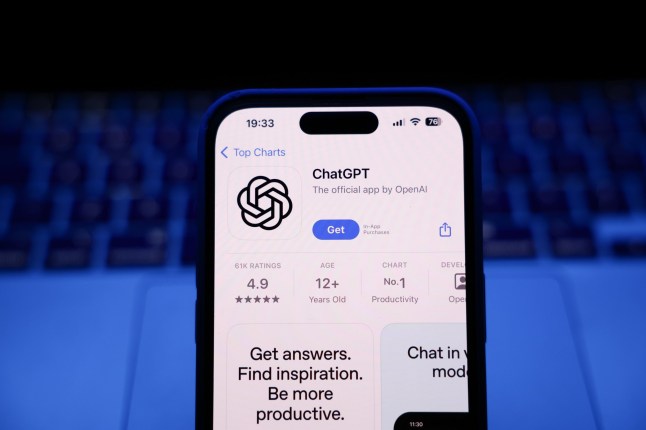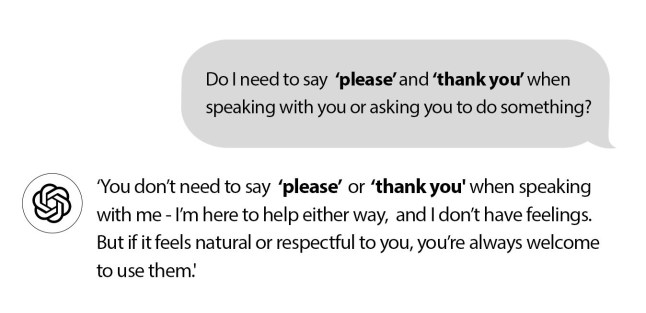
对于任何读到这篇文章的英国人来说,你可能需要抵制保持礼貌的强迫性冲动(图片:Metro)
“我想知道 OpenAI 因人们对他们的模型说'请'和'谢谢'而损失了多少电费。”
这是最近有人在 X 上提出的关于 ChatGPT 的问题,ChatGPT 是 OpenAI 由人工智能 (AI) 驱动的虚拟助手。
答案是“数千万美元”,OpenAI首席执行官萨姆·奥尔特曼(Sam Altman)表示。
数千万美元花得值——你永远不知道
— 山姆·奥特曼 (@sama) 2025 年 4 月 16 日
“请”和“谢谢”几乎是英国式的。十分之八的英国人对人工智能聊天机器人很友好。
但对人工智能保持礼貌是有代价的——而不仅仅是经济上的。
每次你要求 ChatGPT 写一封电子邮件、撕毁你的 Instagram 个人资料或计划你的每月预算时,它都会消耗能量。
而这个机器人每天的电费估计为4000万度电。这可以为800万部手机充电,据英国商业能源公司称。
数据中心——人工智能的机房——使用水来保持凉爽。准确地说,每天至少 3916 万加仑。
这足以装满 978,000 个浴缸或冲马桶 2400 万次。
ChatGPT 是生成式人工智能的一个例子——可以制作文本和图像等内容的技术。它之所以能做到这一点,是因为它是一个大型语言模型,一个通过分析来自互联网的数据来学习的神经网络。
这需要惊人的功率才能实现,挪威阿格德大学教授莫滕·古德温告诉 Metro
“数据必须被传输、处理和存储,无论消息是复杂的请求还是简单的”谢谢“,”AI Experts 的首席科学家说。

人工智能聊天机器人通过重新创建他们在网上看到的内容来制作内容(图片:Jakub Porzycki/NurPhoto/Getty Images)
“谷歌搜索、电子邮件或 Teams 会议也是如此。你甚至可以争辩说,人类互相说“谢谢”也需要能量,尽管数量非常少。
伍斯特大学心理学首席讲师丹尼尔·法雷利博士告诉《地铁》杂志,公司试图通过使用导致地球变暖的化石燃料来满足人工智能永不满足的饥饿。
“所有在线活动都有碳足迹,从使用人工智能聊天机器人到发送短信,”他说。
“虽然这些单一影响通常很小,但它们在全世界每天发生数百万次——数十亿次,因此这些影响对环境的影响总的可能是相当大的。
“再加上这些成本对我们来说是看不见的(例如,与我们在天空中看到的飞机燃烧的燃料产生的蒸汽轨迹相比),这使得在线活动对环境的潜在影响成为一个真正的问题。”

当我们问 ChatGPT 时,ChatGPT 并没有太大惊小怪
说到聊天机器人,奉承会让你一事无成。一项研究发现,礼貌的提示对人工智能的表现影响“可以忽略不计”。
合著者、乔治华盛顿大学物理学教授尼尔·约翰逊在接受《地铁》采访时说:“你对你的烤面包机好吗?我们不会在面包片上贴上生日包装,让它看起来更漂亮。
“同样,对人工智能友善会增加额外的”包装“词,这可能会让人工智能感到困惑,并花费你和公司的钱——特别是如果你为它的提示付费。”
艾伦·图灵研究所高级研究员罗伯特·布莱克威尔(Robert Blackwell)向Metro解释说,说“请”和“谢谢”会增加人工智能的电费,因为人工智能的“思维方式”。
‘When chatting with an AI,words are tokenised – split into smaller pieces – before being processed,’ he said.
‘The more tokens or words used,the higher the cost for the companies running these models.

OpenAI says that people being polite to ChatGPT costs the company ‘tens of millions of dollars’ (Picture: Bloomberg via Getty Images)
‘Newer reasoning models use even more tokens as they try to justify and check their answers.’
There are some reasons to be kind to AI,though. A growing amount of research suggests that how we treat AI reflects how we treat one another.
Goodwin,who is also deputy director at the Centre for Artificial Intelligence Research,said that language models learn from the people who use them.
‘If you are polite everywhere,even to chatbots,the norm becomes to be polite,’ he said.
A big draw to AI is how it can carry out tasks to an almost human-level proficiency. That’s a lot for the average person to get their head around.
So we anthropomorphise AI – project human attributes onto objects – to make sense of ‘something that feels human but isn’t’,Luise Freese,who runs the tech blog,M356 Princess,told Metro.

The Terminator franchise featured killer robots and a rogue AI system (Picture: StudioCanal/REX/Shutterstock)
Terminator is partly to blame,she joked,as AI is seen as exciting as it is scary.
‘The idea of robot overlords is burned into pop culture. So we joke and humanise these systems; it’s a coping mechanism,’ the Microsoft MVP winner for M365 development and Business Applications told Metro.
‘But that’s where it gets tricky: these tools don’t have thoughts or feelings; they just mirror patterns. When we treat them like friends,we risk forgetting that.’
Many chatbots make things up,something that happens so frequently that researchers had to make a word for it,‘hallucinating’. Medical experts have found that it comes up with phoney health studies,while mental health professionals worry about people turning to the bots for therapy.
Some people place a lot of faith in AI,believing it has the same level of understanding and empathy as a human,when it does not,Ana Valdivia,a departmental research lecturer in AI at Oxford,told Metro.
‘The tendency to humanise AI isn’t merely innocent curiosity,’ she said,‘it is a byproduct of how these technologies are marketed and framed,often encouraging emotional dependency or misplaced trust in systems that are,at their core,mechanical.’
United News - unews.co.za